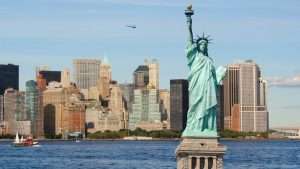The Volokh Conspiracy
Mostly law professors | Sometimes contrarian | Often libertarian | Always independent
The Somin Family's D-Day
June 6 is not only the anniversary of D-Day, but also of the Somin family's arrival in America, back in 1979. This post reprints my reflections on that milestone, which I hope remain relevant today.

Today is the anniversary of D-Day, and also of the Somin family's arrival in the United States, way back in 1979. I posted some reflections on that event on the occasion of its fortieth anniversary in 2019. I repost that short piece below, as I think the points made remain relevant, especially in an age of ill-advised pandemic-era migration restrictions, some of which have yet to be lifted:
In addition to being the 75th anniversary of D-Day, today is the 40th anniversary of the Somin family's arrival in America! I wrote about our experience of immigration from the Soviet Union to the United States in this 2010 memoir, written for the Hebrew Immigrant Aid Society (HIAS), which helped us gain admission to the US, and continues to assist refugees from many parts of the world, to this day.
Reflecting on this experience, I am profoundly grateful to my parents for making the decision to come to the US, and also to those who fought at D-Day, Gettysburg, and elsewhere to establish, expand, and protect the freedoms that make America a haven for immigrants seeking liberty and opportunity from around the world.
Reflection also inspires humility. I am vastly better off than my peers who remained in Russia. But virtually all of that difference is the result of the difference between American institutions and Russian ones, not any merit of mine. We should strive to ensure that more people are able to enjoy liberty and opportunity unconstrained by arbitrary circumstances of ancestry and place of birth.
At its worst, America is susceptible to the same types of ethnic, religious, racial, and nationalistic prejudices as all too many other nations. But at its best, it is the nation where freedom and opportunity can be yours regardless of who your parents were, or where you were born; the nation where immigrants are accepted more fully than in almost any other.
In our time, it is fashionable to assume that only people who are themselves members of a particular identity group can truly understand its experience. If so, perhaps only immigrants can fully grasp the value of immigration. Thus, some readers may assume that my work on the importance of "voting with your feet" and migration rights is an outgrowth of my personal experience.
But, in truth, it began with my engagement with the political economy literature on federalism (which helped me grasp the importance of domestic foot voting). Later, the writings of scholars such as Bryan Caplan, Michael Clemens, and Joseph Carens, helped me see that international migration is an even more significant pathway to expanding human freedom and opportunity; not just one liberty among many, but one of the great issues of our time. To my knowledge, all of them are themselves native-born citizens of western liberal democracies. Yet it was they who enlightened me about the broader significance of migration rights, rather than vice versa.
It is a small, but perhaps telling example of how understanding often comes through logic and evidence, not just personal experience accessible only to members of a particular group. It also offers a measure of hope that we can expand liberty for both immigrants and natives with the help of many who never personally experienced the injustices they seek to end.


Show Comments (46)